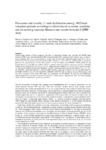Mostrar o rexistro simple do ítem
Prevalence and severity of renal dysfunction among 1062 heart transplant patients according to criteria based on serum creatinine and estimated glomerular filtration rate: results from the CAPRI study
| dc.contributor.author | Crespo-Leiro, María Generosa | |
| dc.contributor.author | Delgado-Jiménez, Juan F. | |
| dc.contributor.author | Paniagua-Martín, María J. | |
| dc.contributor.author | Vázquez de Prada, José A. | |
| dc.contributor.author | Fernández-Yáñez, Juan | |
| dc.contributor.author | Almenar-Bonet, Luis | |
| dc.contributor.author | Díaz Molina, Beatriz | |
| dc.contributor.author | Roig, Eulàlia | |
| dc.contributor.author | Arizón-del-Prado, José M. | |
| dc.contributor.author | Alonso-Pulpón, Luis | |
| dc.contributor.author | Garrido, Iris P. | |
| dc.contributor.author | Sanz-Julve, Marisa | |
| dc.contributor.author | De la Fuente-Galán, Luis | |
| dc.contributor.author | Mirabet, Sonia | |
| dc.contributor.author | Manito-Lorite, Nicolás | |
| dc.contributor.author | Muñiz, Javier | |
| dc.date.accessioned | 2015-09-17T07:54:24Z | |
| dc.date.available | 2015-09-17T07:54:24Z | |
| dc.date.issued | 2009-12-18 | |
| dc.identifier.citation | Crespo-Leiro MG, Delgado JF, Paniagua MJ, Vázquez de Prada JA, Fernández-Yáñez J, Almenar L, et al. Prevalence and severity of renal dysfunction among 1062 heart transplant patients according to criteria based on serum creatinine and estimated glomerular filtration rate: results from the CAPRI study. Clin Transplant. 2010;24(4):E88-E93 | es_ES |
| dc.identifier.uri | http://hdl.handle.net/2183/14938 | |
| dc.description.abstract | [Abstract] Chronic kidney disease (CKD) is staged on the basis of glomerular filtration rate; generally, the MDRD study estimate, eGFR, is used. Renal dysfunction (RD) in heart transplant (HT) patients is often evaluated solely in terms of serum creatinine (SCr). In a cross-sectional, 14-center study of 1062 stable adult HT patients aged 59.1 ± 12.5 yr (82.3% men), RD was graded as absent-or-mild (AoM), moderate, or severe (this last including dialysis and kidney graft) by two classifications: SCr-RD (SCr cutoffs 1.6 and 2.5 mg/dL) and eGFR-RD (eGFR cutoffs 60 and 30 mL/min/1.73 m2). SCr-RD was AoM in 68.5% of patients, moderate in 24.9%, and severe in 6.7%; eGFR-RD, AoM in 38.6%, moderate in 52.2%, severe in 9.2%. Among patients evaluated <2.7, 2.7-6.2, 6.2-9.5 and >9.5 yr post-HT (the periods defined by time-since-transplant quartiles), AoM/moderate/severe RD prevalences were <2.7, SCr-RD 74/21/5%, eGFR-RD 47/47/6%; 2.7-6.2, SCr-RD 73/22/5%, eGFR-RD 37/56/7%; 6.2–9.5, SCr-RD 69/24/7%, eGFR-RD 37/54/9%; >9.5, SCr-RD 58/32/10%, eGFR-RD 32/52/16%. The prevalence of severe RD increases with time since transplant. If the usual CKD stages are appropriate for HT patients, the need for less nephrotoxic immunosuppressants and other renoprotective measures is greater than is suggested by direct SCr-based grading, which should be abandoned as excessively insensitive. | es_ES |
| dc.language.iso | eng | es_ES |
| dc.publisher | Wiley | es_ES |
| dc.relation.uri | http://dx.doi.org/10.1111/j.1399-0012.2009.01178.x | es_ES |
| dc.rights | This is the peer reviewed version of the article which has been published in final form at Wiley Online Library. This article may be used for non-commercial purposes in accordance with Wiley Terms and Conditions for self-archiving. | es_ES |
| dc.title | Prevalence and severity of renal dysfunction among 1062 heart transplant patients according to criteria based on serum creatinine and estimated glomerular filtration rate: results from the CAPRI study | es_ES |
| dc.type | info:eu-repo/semantics/article | es_ES |
| dc.rights.access | info:eu-repo/semantics/openAccess | es_ES |
Ficheiros no ítem
Este ítem aparece na(s) seguinte(s) colección(s)
-
GI- GRINCAR - Artigos [216]






